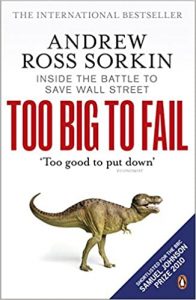
Mid-week Reflection (Hosea 10:1-3; 7-8; 12) [8th July 2020]
In 1984, U.S. Congressman Stewart McKinney first used the term “to big to fail” technically. During the financial crisis of 2007-2008, the term entered public financial discourse. Federal Reserve Chair Ben Bernanke also defined the term in 2010: “A too-big-to-fail firm is one whose size, complexity, interconnectedness, and critical functions are such that, should the firm go unexpectedly into liquidation, the rest of the financial system and the economy would face severe adverse consequences.”
The same Bernanke pointed out that these firms could generate severe moral hazard. The economist Joseph Stiglitz wrote in 2009: the firms to big to fail are to big to exist. We know what happened during that financial crisis. Governments used taxpayers’ money and financed companies to big to fail for fear that the economies of the states would be too affected. The consequence was that those large firms continued to use toxic assets that continued to affect the economies of the states to this day. Many economists and the media have suggested that companies that are too large should be fragmented into smaller companies so that they cannot have too much political influence or the possibility of breaking the rules of a free market. The truth is that big to fail firms ignored market rules and imposed their own rules, the crisis being largely caused by them.
I do not intend to teach an economics lesson, but what has happened and is happening in our world is so similar to what the proposed biblical text, as basis for our reflection, tells us. (Hosea 10:1-3; 7-8; 12). About the eighth century BC, the prophet Hosea reminds Israel of her captivity. He does not present the situation of captivity as an act of God’s will to punish the Jews, his chosen people, but as a consequence of their previous life. It is true that the prophet speaks of God’s judgment, but it happens because the people have chosen to live without him, and now they are experiencing this: he is taken captive.
The reality is more painful for the chosen people as they remember the glorious time before the captivity, a time that the prophet also talks about. But the prophet reminds them of that time of glory to show them how badly the chosen people lived and disregarded the one who blessed them with that time and glory. The prophet reminds the people in an extremely defective way: when you saw yourself getting bigger and richer, you thought that nothing bad could happen to you and that everything depended on you and your power and wealth. You have been convinced that you do not need your God. You made your gods after your heart and began to honour them. You chose the gods you made because you wanted to live by your rules, and those gods were comfortable, because they did not put in front of you the evil in which you sink.
The image that the prophet presents is desolate: thistles and thorns grow on your altars. In this way he says to the people: this is the power of your gods, which you have chosen for you. Did you understand the situation you ended up in and the reason for this situation? Then it’s time to do something. Start doing justice, live in truth, fairness, righteousness. The reality of the day is presented extremely simply, but also very explicitly: what you sow today, you will reap in the future. Seek God through your life.
The beauty of the Old Testament lies in its relevance to our lives. We live in a society where science offers many answers. Money controls, buys and dictates the rules. The technology and the level of knowledge we have reached makes us feel invulnerable. We convince ourselves that everything depends on us. But things are happening around us that get us out of control. Natural phenomena that we cannot predict, but that we have partly caused, are beginning to destroy the balance that we knew and that we thought we could maintain. When we come to believe that we have drugs to cure all kinds of diseases, something almost unobservable appears at first, but that changes the way we live, worldwide. And we are powerless.
We believe that the social order in which we live is eternal and we enjoy days of peace, believing that it can not be otherwise, but an event on the other side of the world brings to the surface deep wounds caused by selfishness and arrogance in our history. Far too many no longer believe in the spiritual world, but the ghosts of the past have begun to haunt us again.
The Prophet is convinced that the chosen people understood what was happening to him and invited him to begin to “sow” for a different future. But did we understand why it happens to us? What kind of “seed” are we starting to sow for our future? Reality shows us that we are never too big, too rich, too strong, too knowledgeable to save ourselves from the consequences of our actions.
(Revd. Bernard Noghiu, Southend on Sea – 8th July 2020)
